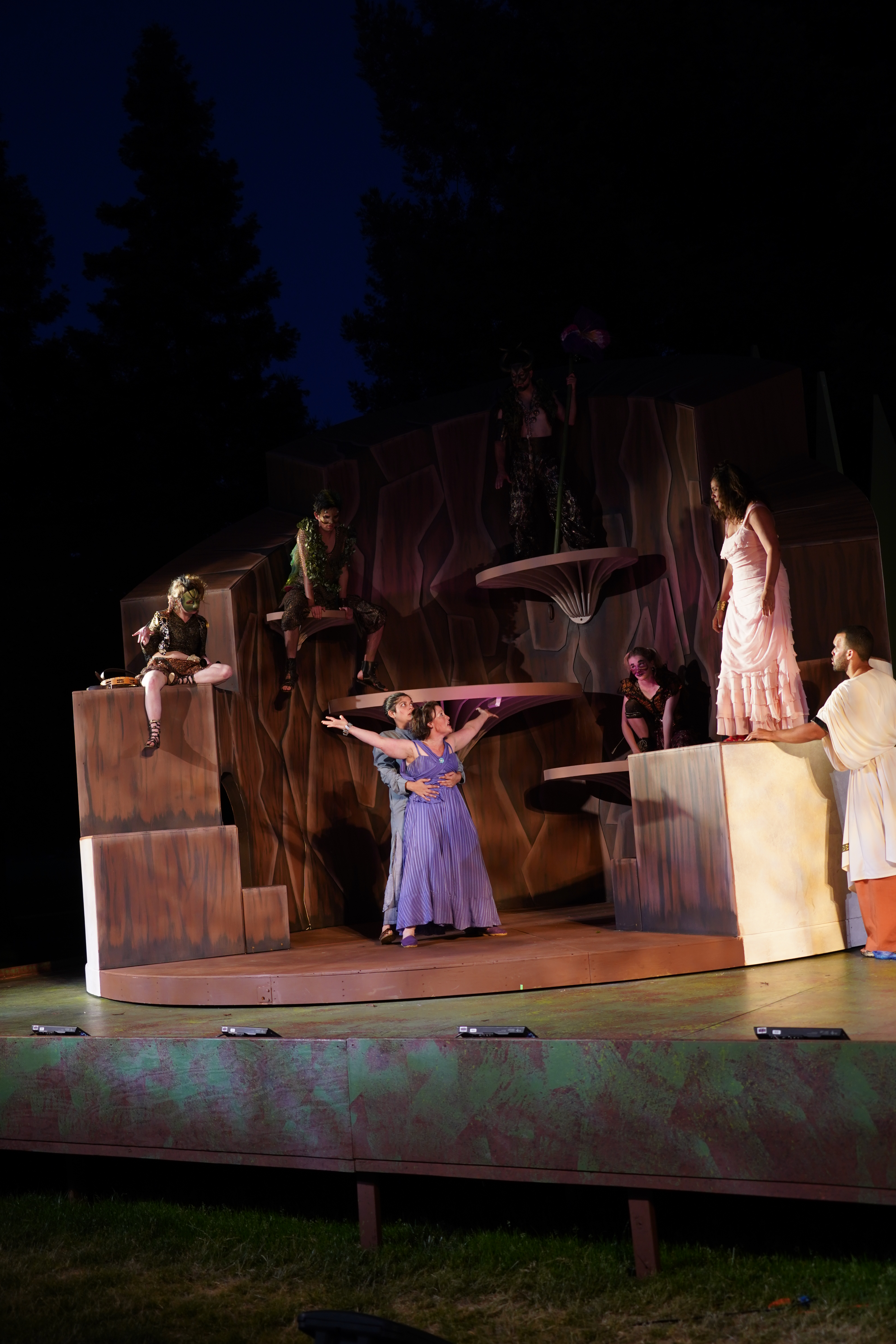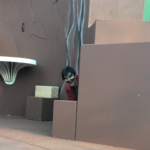by Kalina Ko, Literary Intern
On June 29, I gave a dramaturgical talk before our invited dress rehearsal. The talk focused on salient aspects of our production that had come up during rehearsal and that I felt were interesting and relevant to our modern day life. Since then, I’ve had the opportunity to talk with the cast more and experience the show a few more times. I’ve been able to reflect further on the themes featured in the play. The following is an updated and modified version of the dramaturgical talk I gave on June 29.

The very first time I ever read A Midsummer Night’s Dream, I was in middle school, and it was for an English class. I wasn’t really interested in the scansions and the themes. I really didn’t want to write an analytical paper on what the punctuation of a particular monologue showed me about the character of Lysander. I decided at that moment that I did not like Shakespeare. Yet here I am, six years later at the San Francisco Shakespeare Festival working on A Midsummer Night’s Dream and it’s been an incredibly positive experience, not at all like the middle school English class all those years ago.
The play opens with the entrance of Hippolyta, the Queen of the Amazons and eventual Duchess of Athens. She is, in every sense of the phrase, a stranger in a strange land. She barely speaks the language. She doesn’t understand the customs. She has no companions. It is a striking image that echoes our modern day debate over American immigration.

What does it mean for her to enter a space completely unfamiliar to her? And more importantly, how does she operate; where does she go from there? What is remarkable, for me, about the character of Hippolyta is that despite her circumstances as a stranger in a strange land and furthermore as a woman in a patriarchal society, she claims her rightful place and title as an equal to Duke Theseus. She knows her worth; she knows what’s right; and although she is new to the city, she expresses her opinions and makes it clear to Theseus when she is displeased. Despite the initial tension, we do receive more tender moments between Hippolyta and Theseus later in the show. Theseus grows to value her opinion. Their love and affection for each other becomes clear, and we are able to witness a relationship in which both parties are respectful of and loving of each other.
The relationship of Hermia and Lysander is similarly complex. In our production of A Midsummer Night’s Dream, Lysander does not fall in either of the gender binary. In other words, they do not identify as either a man or a woman. Thus, the pronouns they use are neither “he” nor “she,” but rather “they and them.” Shakespeare did not initially write Lysander as non-binary and therefore the pronouns had to be edited for our show. The places where pronouns were changed were done so with extreme thought. For example, Egeus, Hermia’s father, refuses to use the correct pronouns for Lysander. The fairies on the other hand, have a different understanding of gender and thus often use “they/them” pronouns for anyone thereby leading to the confusion of Robin Goodfellow (the Puck) as he accidentally anoints Lysander’s eyes rather than Demetrius’.

Fascinatingly, the queerness of our play is not necessarily unique and can be traced in the history of A Midsummer Night’s Dream. Back in Shakespearean England, the women in plays were usually played by young boys who had not yet undergone puberty. Thus, plays in that time were queer simply by the nature of who played the characters. After the initial run of A Midsummer Night’s Dream, it was not performed in full again until 1840. In 1840, Lucia Vestris, an opera singer, decided to stage the play exactly as Shakespeare had written it. She herself actually played Oberon. She started the trend of female actresses playing Oberon and Robin. Again, the manipulation of gender is seen in the history of the play.
This new understanding of Lysander’s gender also gives a more concrete reason for Egeus’ dislike of them. It gives modern relevance to the very severe “ancient privilege of Athens” that Egeus calls upon. He would rather his daughter die than enter into a queer relationship. This unspoken but very clear reason for his decision is unfortunately all too close to the reality of many people today. There are many parents who would rather their child die than be in a queer relationship. Unfortunately, it results in a number of conflicts and upsetting stories today. Of course, our play does have a happy ending. Hermia and Lysander’s love prevails. They do get married and in between they share a number of incredibly sweet and tender moments that bring a smile to my face every single time I see those scenes.

Although magical creatures, the fairies also have very human moments. They quarrel. They play tricks. They make mistakes. One of my favorite moments in the play is when Titania lays bare the entire premise of her fight with Oberon. Her descriptions paint a harrowing picture of the climate change issue we face today. In addition to the eloquent language and beautiful delivery of the monologue, I love the way in which Titania takes responsibility for her actions. She tells Oberon that it is their fault that the seasons are changing and that the environment is wreaking havoc on human lives. They’ve created a large problem and Titania is owning up to it. If magical fairies can accept responsibility, can we as humans do the same?
The real magic of A Midsummer Night’s Dream, in my opinion, is in the way that Shakespeare is able to weave together a magical world with reality. What I love about this particular production is the absolute embrace of the magic of the show. Rather than shying away from the fantasy, every member of the cast and crew has embraced the fantastic fairies, the magical flowers, and beautiful setting wholeheartedly. There are very serious moments to the show, and we’ve looked carefully at those moments. We’ve also embraced the joy, the humour, the light-heartedness, and the happy ending of this show. In a political and social climate as charged as our modern day world, this play reminds us to laugh and to smile even while battling more serious issues.
Our production has also made the decision to double cast many of our actors as both a fairy and a human. A common phrase that has shown up in rehearsal is “find your inner fairy.” There’s a little bit of magic in every character and in every actor. By the end of the play, everyone does “find their inner fairy.” So forget your high school scansions. Forget the punctuation and the iambic pentameter. Allow yourself to be immersed in the magic of the play. Embark on this journey with us and find your inner fairy along the way.
At the time of my writing and revising this speech, I am nearing the end of my time with the San Francisco Shakespeare Festival. It has been a fantastic two and a half months. I have laughed a lot, contributed a lot, and learned a lot. Perhaps the most important thing I learned, however, is how much we need theatre and the arts to remind us of our humanity. This play, magical as it is, tells a relatable story. The characters are flawed but recognizable. I see the trickster Puck in my ten year old cousins. I see the over-protective mother, Titania, in my own mother. I see the powerful Hermia, willing to stand up for what she believes in in my sister. These characters are all around us and in watching this play I am reminded that they are still human; they are flawed; and despite their flaws, they deserve our sympathy and our love.








